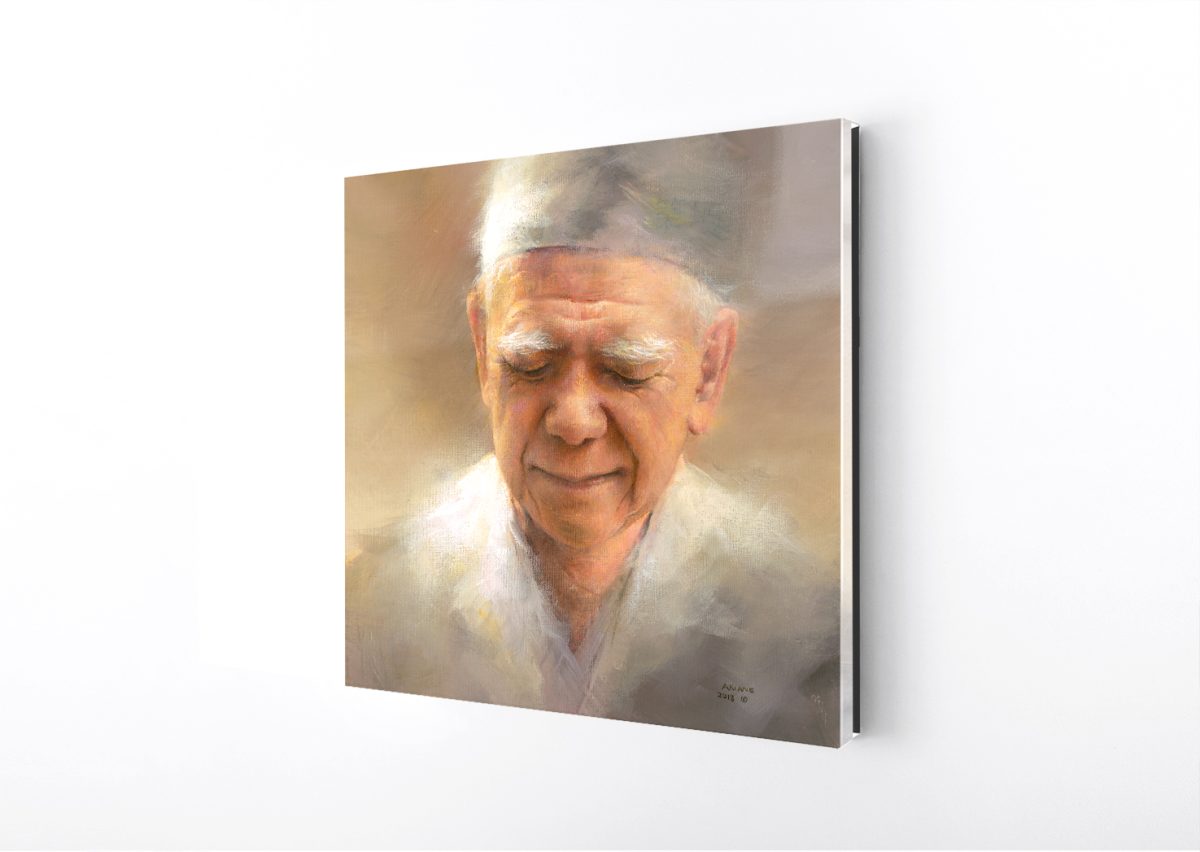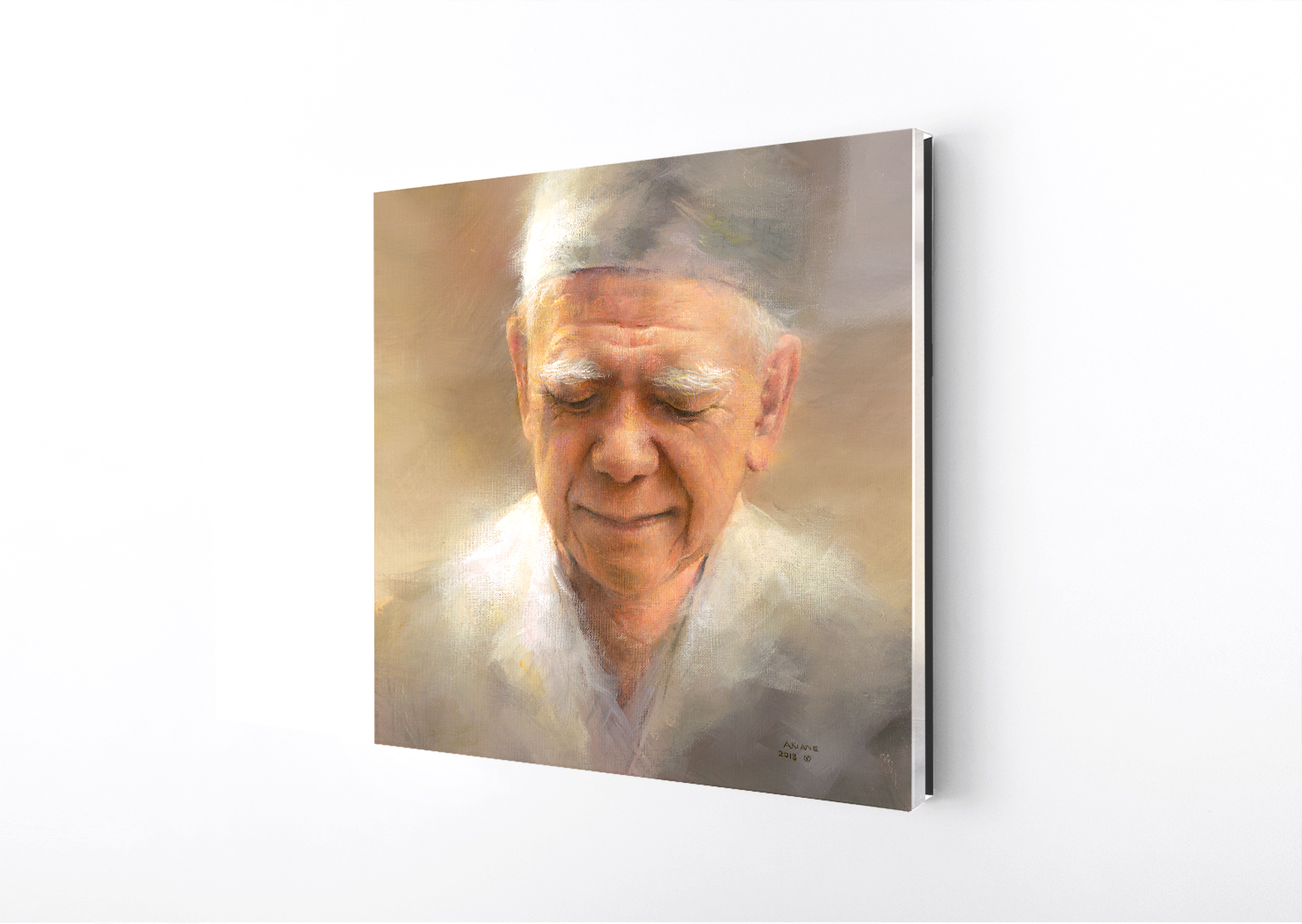
Tokyo Chef | 12×12 Acrylic Wall Art
“The art of balance between man and nature and between old and new… The world of harmony, beauty and perfection. A world like no other…”
I’m showcasing two paintings inspired by my trip to Japan. Since I was nine years of age I wanted to find out everything I could about the mysterious Japanese culture. I adopted the art of minimalism and even tried learning the language. I spent hours in the Japanese gardens, wore my kimono, ate with chopsticks, drank ceremonial matcha tea, ate sushi, slept on a futon on the floor, and watched tear-jerking studio Ghibli animations. But nothing prepared me for my real experiences in Japan. I was transported into a world like no other.
The world of harmony, beauty and perfection. I had never met so MANY humble, tender-hearted, gracious and empathetic people in my life. I gave my best to blend in and be part of the culture. I tried to mingle with the crowds, and be like one of the Japanese, but I quickly discovered it was not easy. Japan is a homogenous society and there are few foreigners and even fewer Caucasians, so I could not escape the curious glances and even television interviews.
Despite looking very different I did my best immersing in the authentic Japanese living and its intricate language. As a result, I was blessed to experience, first hand, a genuine hospitality and kindness offered to me by countless strangers. Japanese are some of the most hardworking people in the world, and I often witnessed the business men literally collapse from exhaustion on the streets. Just like honey bees working without stopping, wearing out their wings, millions of hardworking citizens would wear themselves out. Loyalty and responsibility to the group of a company, a school or a family is top priority and the most profound cultural distinction.
Japanese blend the old traditions with high technological advancements in the most surprising way. With easy zoning codes there is a huge architectural contrast in the cities such as Tokyo. Next to skyscrapers anyone could build a house as small as a birdhouse. There are very few air conditioned premises. Even at 100 degrees heat and oppressive 90 degree humidity. Wherever I traveled was a steaming sauna. Just about everything came in compact sizes in the cities, from the store items and furniture, to apartments, the hotel capsules and restaurants. One place had just four seats, and the waitress had only a few inches to squeeze in behind our backs in order to serve the meals. Yet the attention to the smallest details in aesthetics and taste was truly unforgettable. Almost every town I visited in Japan had an access to fresh seafood, vegetables and herbs.
I was surprised to see so many robust elders still farming, and carrying heavy loads up the steep mountains in the countryside. I never once encountered a rude or arrogant Japanese. Everyone, and I mean everyone, without any exception, exhibited the highest level of modesty, politeness and integrity. Both in the cities and the villages. The Japanese are true artisans. In their gardens. In their kitchens. And in their homes. Their art of cordiality, the language of respect for each and every person is what makes this country so unique. But it was the art of balance between nature and man and between old traditions and the new ones what captured my artistic eye. The contrast of red accents against the luminosity of greens I had never seen anywhere else exemplified this breathtaking island I so fell in love with. The heart of Japan is filled with art. The heart that left a soft spot in mine.
p.s. When I was nine years old I painted “Summer Snow,” but for some reason it remained virtually invisible. Month after month. Year after year. The painting was unnoticeable in every art exhibition. Seeing my concern my mother once tried reassuring me, “Akiane, nobody can recognize this painting because your story is a painted haiku only Japanese will appreciate. One day it will be in Japan.” Fourteen years after I painted “Summer Snow” it was chosen as a beloved art piece by one avid Japanese collector. The original is now exhibited near Tokyo.
Available
About Acrylic Wall Art:
Ready to Hang! Printed with high quality pigmented inks and technology. Longevity 70 to 100 years. We use museum quality no glare acrylic. We seal the back with Sintra Board that has a 200 year shelf life.


